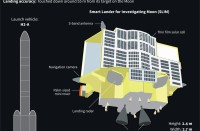
NEW YORK, United States (AFP) — US carmaker Ford is preparing to cut several thousand jobs to reduce costs and intensify its transition to electric vehicles, US media reported on Wednesday.
The group is expected to announce the elimination of more than 4,000 jobs in the coming weeks, according to the Wall Street Journal, which cited people close to the matter.
Factory workers are not expected to be affected, the report said.
Bloomberg said as many as 8,000 jobs could be affected.
Contacted by AFP, a Ford spokesman did not want to comment on “speculation”.
But the group has scheduled a conference call on Thursday to give an update on its plan to transform to electric vehicles.
“Key Ford executives will provide details on how the company is building out its industrial system to reach a global production run rate of 600,000 EVs, growing to more than 2 million EV annual global run rate by 2026,” the company said in a statement.
“As we’ve said lots of times, to deliver our Ford+ transformation and lead an exciting and disruptive new era of electric and connected vehicles, we’re reshaping our work and modernizing our organization across all of the automotive business units and the entire company,” the spokesperson said in his message.
“We’ve laid out clear targets for our cost structure so that we’re lean and fully competitive with the best in the industry.”
Challenged by Tesla and other start-ups, traditional carmakers have accelerated production of their electric models in recent years.
In March, Ford announced the creation of a new dedicated entity: Ford Model e.
At the time, it said it wanted to manufacture two million electric vehicles a year by 2026 — a third of its global production — and planned to spend $50 billion on them.
The company’s executives also said they wanted to cut spending on traditional vehicles to $3 billion a year.
© Agence France-Presse







